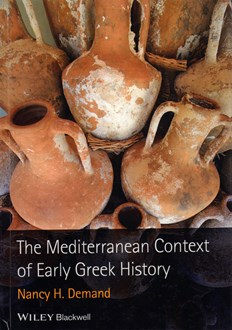The Mediterranean context of early Greek history / Nancy H. Demand.
Yer Numarası
A.IX/7193
ISBN
9781405155519 (hardcover : alk. paper)
9781444342369 (Wiley Online Library)
9781444342345 (ePub)
9781444342338 (ePDFs)
9781444342369 (Wiley Online Library)
9781444342345 (ePub)
9781444342338 (ePDFs)
Dil Kodu
İngilizce
Yazar
Yayın Bilgisi
Chichester, UK ; Malden, MA : Wiley-Blackwell, 2011.
Fiziksel Niteleme
xvi, 353 sayfa : resim, harita ; 25 cm
Genel Not
İndeks s. [349]-353.
Bibliyografi, vb. Notu
Bibliyografya s. [256]-348.
Bibliyografik notlar s. 289-341.
Bibliyografik notlar s. 289-341.
İçindekiler Notu
List of illustrations -- List of abbreviations -- Introduction : the “fantastic cauldron” of the Mediterranean Koine -- Seafaring in the mesolithic Mediterranean -- The neolithic revolution/transition -- The neolithic diaspora -- Urbanization in Mesopotamia -- The Third Millennium -- The Middle Bronze Age, 2000-1550 BC : recoveries -- Late Bronze Age maritime networks -- The Late Bronze Age collapse and its aftermath -- Recovery and expansion, 1050-850 BC.
Özet, vb.
“Were the origins of the Greek city-state - the polis - a unique creation of Greek genius? Or did their roots extend much deeper? Noted historian Nancy H. Demand joins the growing group of scholars and historians who have abandoned traditional isolationist models of the development of the Greek polis and cast their scholarly gaze seaward, to the sparkling waters of the Mediterranean. The Mediterranean Context of Early Greek History reveals the role the complex interaction of Mediterranean cultures and maritime connections had in shaping and developing urbanization, including the ancient Greek city-states. Utilizing, and enhancing upon, the model of the “fantastic cauldron” first put forth by Jean-Paul Morel in 1983, Demand reveals how Greek city-states did not simply emerge in isolation in remote country villages, but rather, sprang up along the shores of the Mediterranean in an intricate maritime network of Greeks and non-Greeks alike. We learn how early seafaring trade, such as the development of obsidian trade in the Aegean, stimulated innovations in the provision of food (the Neolithic Revolution), settlement organization (“political form”), materials for tool production, and concepts of divinity. With deep scholarly precision, The Mediterranean Context of Early Greek History offers fascinating insights into the wider context of the Greek city-state in the ancient world.” -- Yayıncı.


